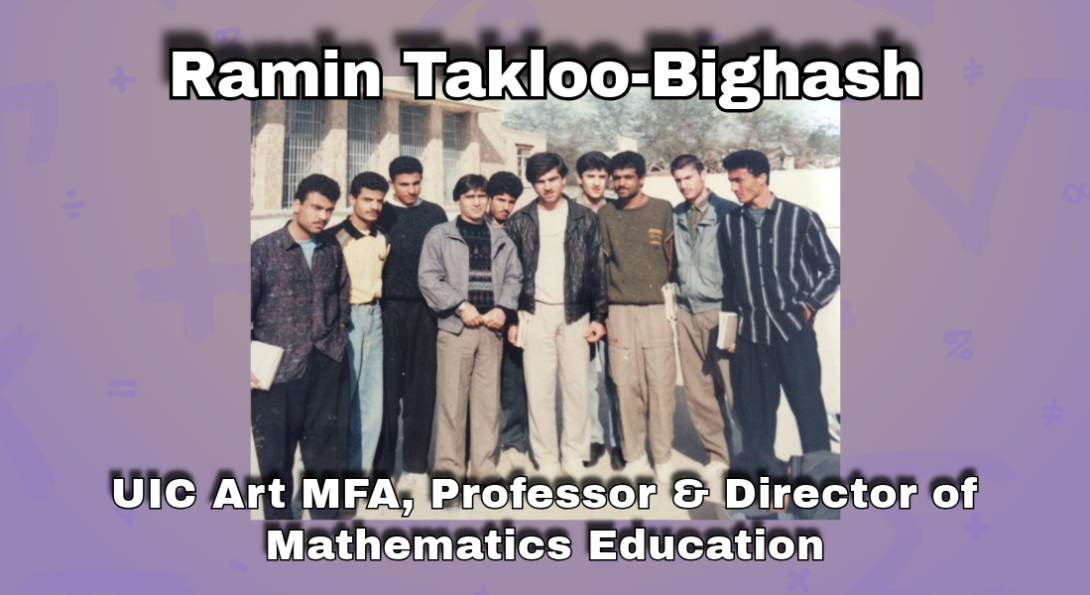Ramin Takloo-Bighash

I was born in Iran, and I grew up speaking Farsi. When I was eight years old my father thought it was time for me to start learning English. To my parents, learning a second or third language was necessary for any educated person’s intellectual development – looking back, I find their approach to education really fascinating given that neither of my parents had a high school diploma. In any case, my parents bought me a book called The Linguaphone, or some such, which came with a set of three audio tapes. The book and the tapes taught British English, and I remember one of the lessons started with the sentence “Many families in London live in flats.” So for the first few years of my life when I spoke English I spoke it with a thick British accent.
And that’s how my journey to learn a second language began. I think the first English book I read was an English translation of Jules Verne’s The Mysterious Island, which I read when I was probably 13 and which I found absolutely fascinating. A bunch of my friends had read the Farsi translation of the book – I distinctly remember arguing once about a scene in the book, and I said something to the effect that “oh, if you read that chapter in English, you will see that the Farsi translation is not accurate” and it really wasn’t, though I no longer remember what the issue had been.
In the 80s, learning Arabic was mandatory in Iran, and I believe it still is. At the time, students would start learning Arabic in sixth grade, so that was my third language. The issue with the Arabic we were taught was that it was Quranic Arabic, which, while beautiful and poetic, had little to do with the modern world. School also required us to learn English starting in sixth grade, but that posed no challenge, because by this point I’d been learning English for a few years. I lived in southern Iran throughout my childhood, so I could watch TV from Arab countries along the southern edge of the Persian Gulf. These TV stations were often bilingual, Arabic and English, or they had dedicated channels to Arabic and English programming, and I grew up watching these programs.
I moved away from southern Iran in 1992 to attend college in Tehran, and in 1995, I moved to Baltimore for grad school in mathematics at Johns Hopkins University. As part of the graduate program, we needed to pass a language exam –I decided to take the exam in French because I thought it was easier than Russian or German which were the other options. I studied for a few weeks, and I was, somehow, able to pass the French exam (which was really translating a French text to English with help from a dictionary), but I felt so bad about passing the exam without really knowing the language that I decided to take French and actually learn the language. I sat in a couple of semesters of French classes at Hopkins and learned some rudimentary French. Surprisingly, even the little French I learned in those classes has been extremely helpful to me throughout my career as a mathematician as I’ve consistently needed to read articles and books in French.
A few years ago I thought it might be good to refresh my knowledge of French so I sat in a couple of French classes at UIC, and this was a nice refresher of the basics. Recently I’ve started taking French again, mostly because now both of my children speak French fluently and I don’t want to be left out of their conversations, and it’s going well. But relearning French has had some other benefits. Recently I was asked to referee a paper written by a famous French mathematician for a prestigious journal. The editor told me that they were having trouble finding a referee for the paper because people were intimidated not only by the math, but also by the French of the paper. After examining the paper I found neither to be particularly intimidating, and I decided to accept the assignment to referee the paper. I also spent about a month over the winter break in Paris and visited both Sorbonne in Paris and IHES (ihes.fr). While I did not need French at the institutes themselves (though I was tempted to give the lecture I gave at Sorbonne in French), it was extremely helpful to know some French to get around, to ask for directions, to buy groceries, to order food, etc.
Other than Farsi, English, French, and Arabic, over the years I’ve also learned some German – not enough to read math or philosophy, but definitely enough to read a menu and order food or coffee whenever I travel to Germany. I’ve also forgotten most of the Arabic I once knew, so I’m planning to take Arabic at UIC once I’m a bit more functional in French, and maybe also German and Russian at some point. We will see.